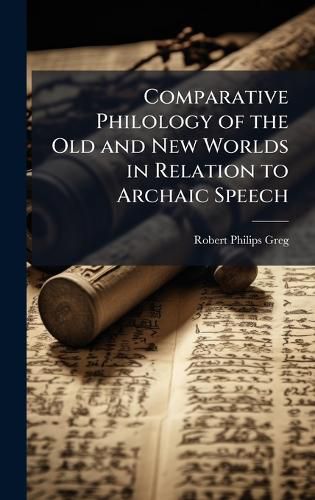Readings Newsletter
Become a Readings Member to make your shopping experience even easier.
Sign in or sign up for free!
You’re not far away from qualifying for FREE standard shipping within Australia
You’ve qualified for FREE standard shipping within Australia
The cart is loading…






"Comparative Philology of the Old and New Worlds in Relation to Archaic Speech" by Robert Philips Greg, originally published in 1893, explores the fascinating connections between languages across continents. This detailed study delves into the roots of language, examining the archaic forms of speech and their evolution in both the Old World (Europe, Asia, and Africa) and the New World (the Americas).
Greg's work offers insights into the historical relationships between cultures and the development of linguistic structures. This volume remains a valuable resource for linguists, anthropologists, and historians interested in the comparative study of language and its cultural implications. Discover the intricate links between seemingly disparate languages and gain a deeper understanding of the shared linguistic heritage of humanity.
This work has been selected by scholars as being culturally important, and is part of the knowledge base of civilization as we know it. This work was reproduced from the original artifact, and remains as true to the original work as possible. Therefore, you will see the original copyright references, library stamps (as most of these works have been housed in our most important libraries around the world), and other notations in the work.
This work is in the public domain in the United States of America, and possibly other nations. Within the United States, you may freely copy and distribute this work, as no entity (individual or corporate) has a copyright on the body of the work.
As a reproduction of a historical artifact, this work may contain missing or blurred pages, poor pictures, errant marks, etc. Scholars believe, and we concur, that this work is important enough to be preserved, reproduced, and made generally available to the public. We appreciate your support of the preservation process, and thank you for being an important part of keeping this knowledge alive and relevant.
$9.00 standard shipping within Australia
FREE standard shipping within Australia for orders over $100.00
Express & International shipping calculated at checkout
"Comparative Philology of the Old and New Worlds in Relation to Archaic Speech" by Robert Philips Greg, originally published in 1893, explores the fascinating connections between languages across continents. This detailed study delves into the roots of language, examining the archaic forms of speech and their evolution in both the Old World (Europe, Asia, and Africa) and the New World (the Americas).
Greg's work offers insights into the historical relationships between cultures and the development of linguistic structures. This volume remains a valuable resource for linguists, anthropologists, and historians interested in the comparative study of language and its cultural implications. Discover the intricate links between seemingly disparate languages and gain a deeper understanding of the shared linguistic heritage of humanity.
This work has been selected by scholars as being culturally important, and is part of the knowledge base of civilization as we know it. This work was reproduced from the original artifact, and remains as true to the original work as possible. Therefore, you will see the original copyright references, library stamps (as most of these works have been housed in our most important libraries around the world), and other notations in the work.
This work is in the public domain in the United States of America, and possibly other nations. Within the United States, you may freely copy and distribute this work, as no entity (individual or corporate) has a copyright on the body of the work.
As a reproduction of a historical artifact, this work may contain missing or blurred pages, poor pictures, errant marks, etc. Scholars believe, and we concur, that this work is important enough to be preserved, reproduced, and made generally available to the public. We appreciate your support of the preservation process, and thank you for being an important part of keeping this knowledge alive and relevant.